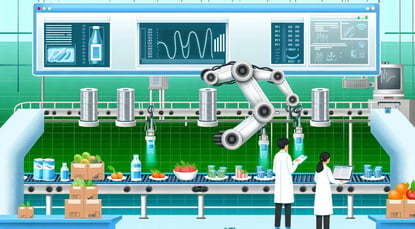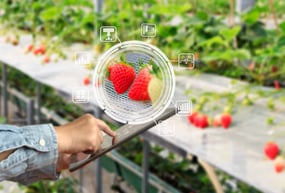Advanced Quality Control Technologies
Ensuring the highest quality standards while maintaining operational efficiency is vital in food and beverage manufacturing. As a Production Planner, you play a crucial role in orchestrating the delicate balance between quality control and production output.
In this blog, we look into the realm of advanced quality control technologies, exploring their integration with industry-leading Enterprise Resource Planning (ERP), Supply Chain Management (SCM), and Manufacturing Execution Systems (MES) like PlanetTogether integrated with SAP, Oracle, Microsoft, Kinaxis, Aveva, and others. Let’s uncover how these integrations can streamline operations and elevate quality standards to new heights.

The Need for Advanced Quality Control
Quality control has long been a cornerstone of manufacturing processes, especially in the food and beverage industry where consumer safety and satisfaction are non-negotiable. Traditional quality control methods, while effective, often pose challenges in terms of speed, accuracy, and scalability. This is where advanced quality control technologies step in, revolutionizing the way manufacturers uphold their standards.

The Role of Production Planning in Quality Control
As a Production Planner, you are tasked with optimizing production schedules, resource allocation, and inventory management—all while ensuring adherence to quality standards. Your decisions directly impact not only operational efficiency but also the final product’s quality and safety.

Leveraging Integration Between PlanetTogether and ERP, SCM, and MES Systems
Integration between advanced planning tools like PlanetTogether and ERP, SCM, and MES systems amplifies the efficacy of quality control measures. By seamlessly syncing production plans with overarching operational systems, this integration empowers Production Planners to make data-driven decisions that prioritize both efficiency and quality.
Streamlining Data Flow with ERP Integration
ERP systems serve as the backbone of manufacturing operations, centralizing data related to inventory, procurement, and finance. When integrated with advanced planning solutions like PlanetTogether, ERP systems provide Production Planners with real-time insights into raw material availability, production costs, and customer demand.
Imagine having instant access to inventory levels, supplier lead times, and customer orders directly within your production planning interface. With ERP integration, you can anticipate potential supply chain disruptions, adjust production schedules accordingly, and maintain optimal inventory levels to meet quality standards without compromising efficiency.
Orchestrating Seamless Communication with SCM Integration
In the dynamic realm of food and beverage manufacturing, effective communication across the supply chain is essential for maintaining quality control. SCM systems facilitate this communication by enabling seamless collaboration between suppliers, manufacturers, and distributors.
When integrated with advanced planning tools like PlanetTogether, SCM systems enhance visibility into the entire supply chain, from raw material sourcing to final product delivery. This visibility enables Production Planners to proactively address quality concerns, such as sourcing alternative ingredients or adjusting production volumes based on supplier performance metrics.
Enhancing Operational Agility with MES Integration
MES systems play a critical role in translating production plans into actionable tasks on the manufacturing floor. By capturing real-time data on equipment performance, labor efficiency, and production outputs, MES systems provide invaluable insights into the execution phase of manufacturing operations.
Integrating MES with advanced planning solutions like PlanetTogether bridges the gap between planning and execution, fostering operational agility and responsiveness. Production Planners can monitor quality metrics in real-time, identify potential bottlenecks or deviations from quality standards, and implement corrective actions swiftly to uphold product integrity.
Exploring Advanced Quality Control Technologies

With the foundation of integrated planning systems in place, let’s look into the realm of advanced quality control technologies reshaping the food and beverage manufacturing landscape.
IoT-Enabled Sensors for Real-Time Monitoring
Internet of Things (IoT) technology has revolutionized quality control by enabling real-time monitoring of critical parameters throughout the production process. IoT-enabled sensors can track temperature, humidity, pH levels, and other key variables, providing insights into product quality and safety.
By integrating IoT data streams with production planning systems, Production Planners can anticipate quality issues before they escalate, triggering proactive adjustments to production parameters or ingredient formulations. This proactive approach not only minimizes the risk of quality deviations but also optimizes resource utilization and minimizes waste.
Artificial Intelligence for Predictive Quality Assurance
Artificial Intelligence (AI) algorithms are increasingly being deployed to predict and prevent quality issues before they occur. By analyzing historical production data, AI models can identify patterns and anomalies indicative of potential quality deviations, allowing Production Planners to intervene proactively.
Integrating AI-powered quality prediction models with production planning systems empowers Production Planners to make preemptive decisions to maintain quality standards. Whether it’s adjusting production parameters, optimizing batch sizes, or sourcing alternative ingredients, AI-driven insights enable proactive quality assurance without compromising efficiency.
Blockchain for Transparency and Traceability
Blockchain technology offers unparalleled transparency and traceability across the entire supply chain, ensuring the integrity of ingredients and finished products. By recording each transaction and process step in an immutable ledger, blockchain enables stakeholders to trace the journey of a product from farm to fork.
Integrating blockchain with production planning systems enhances visibility into the provenance of raw materials, enabling Production Planners to verify their authenticity and quality. Moreover, blockchain facilitates rapid recalls in the event of quality issues, minimizing the impact on consumer safety and brand reputation.
In food and beverage manufacturing, maintaining quality control while optimizing production efficiency is a balancing act that requires strategic planning and technological innovation. By leveraging integration between advanced planning tools like PlanetTogether and ERP, SCM, and MES systems, Production Planners can orchestrate seamless operations that prioritize both quality and efficiency.
Embracing advanced quality control technologies such as IoT-enabled sensors, AI-driven predictive analytics, and blockchain-enabled traceability empowers Production Planners to stay ahead of quality issues and uphold the highest standards of product integrity.
As a Production Planner, your role in driving this convergence of technology and quality is pivotal in shaping the future of food and beverage manufacturing. Are you ready to take your manufacturing operations to the next level? Contact us today to learn more about how PlanetTogether can help you achieve your goals and drive success in your industry.
























LEAVE A COMMENT